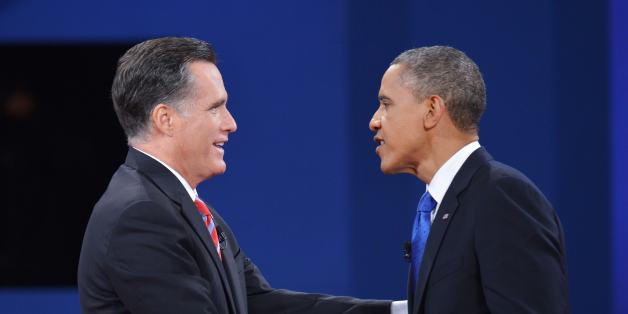Second presidential debate marks more backtracking on energy, same silence on climate change

The tone of last night’s presidential debate reached a new fervor as Governor Romney and President Obama sparred over energy policy. “If you’re asking me a question, I’m going to answer it,” the president retaliated, defending his record. But was this heated back-and-forth a struggle over how to best invest in wind and solar? Or how the country can reduce greenhouse gas emissions after a summer of crippling drought? No, never mind even mentioning climate change: the dominant rhetoric led both candidates to rapidly out-commit each other on their respective stances supporting oil, coal and natural gas. “This has not been Mr. Oil or Mr. Gas or Mr. Coal,” Romney pushed, accusing the president of not supporting dirty fossil fuels nearly enough.
From an environmental and climate perspective, this 12-minute contest on energy was painful and deeply alarming. Escalating attempts to appear furthest on the side of fossil fuels even led President Obama to use Romney’s past stance against a deadly coal plant — stating “this plant kills” as he shut down a Massachusetts polluter — as evidence against the governor’s commitment to coal. This intensification of fossil fuel support comes in a time when it is increasingly critical to act on climate change before the rising global temperatures reach a point of no return. Already this summer has brought historic melting of the Arctic sea ice, a positive-feedback process that sets off even more global warming as reflective ice disappears.
A trend of climate silence and fossil fuel devotion has emerged over the past months in both campaigns, despite pushes from environmental groups and the media. In his post-debate response last night, MSNBC commentator Chris Hayes noted that arguing energy policy without mentioning climate change is like “talking about tobacco without talking about cancer.” Likewise, Friends of the Earth Action president Erich Pica stated that both candidates “failed the American public” by ignoring climate change and that “’all of the above’ is not an acceptable energy policy … it is a highway to hell.” Furthermore, multiple polls show that climate change is a major issue for undecided voters: 74 percent of Americans say that climate change is “affecting the weather of the United States” and a majority of undecided voters say they consider positions on climate change in making their decision. Clearly the candidates’ silence on climate change cannot be argued on the basis that it is an apparently dangerous or controversial topic for voters.
As in the previous presidential debate, during which moderator Jim Lehrer ignored more than 160,000 petitions sent to him from environmental groups requesting he ask a question on climate change, the topic went untouched in the 11 questions posed in Hempstead, N.Y. Moderator Candy Crowley of CNN admitted that she had a question on climate change ready for “all you climate change people,” but forwent it because “we just knew the economy was still the main thing.” Her decision came after a Google-sponsored online campaign to collect and vote on questions for the second debate — of which a climate change question was the clear winner, with over 11,000 votes — was summarily dismissed after voting ended.
Candy Crowley’s comment illustrates a common reason why coal and oil are being promoted so fiercely — namely “jobs” — but the perceived separation of the economy and the environment is dangerously wrong. The recent record-shattering drought and the associated rise in food prices, as well as the tens of thousands of jobs associated with the blossoming wind energy industry, draw a clear connection. Voters know that we’re already seeing the impacts of climate change, so it’s time for President Obama and Governor Romney to follow them and propose concrete plans to address it.
